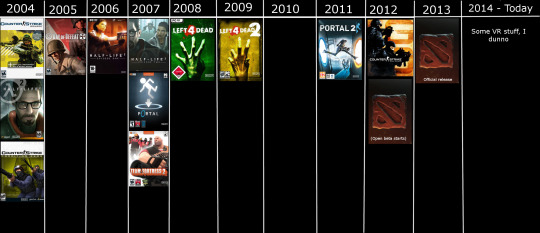#international deals

I recently found this chart on Reddit by u/Molotovn displaying the titles released by Valve since 2004 when Half Life 2 came out among the popularity of the FPS genre for PC games. Back in that period the publishing of the sequel to Half Life raised the bar for many other game developers not only in terms of aesthetics, but also for the experience the gameplay would offer.
Valve has a unique history that defies any other game developers in terms of name content but also on its major controversy of sequel spawn. Gamers have been waiting since 2007 for a Half Life 2 sequel in the shape of a episode installment or stand-alone title.
Meanwhile Valve has published other titles like Portal, Team Fortress 2, Left 4 Dead, Counter Strike: Global Offensive, and Dota 2. These titles all became international hits worldwide for their rich gameplay and extensive user-generated mods availability: you can play Half Life 2 or Left 4 Dead 2 with all the available perks to enjoy again a title coming out ten years ago.
Valve has been constantly criticized for its poor communication skills with their player base which left many people disappointed over the future of the Half Life destiny. The many rumors and leaks over the years condensed into an even more confusing direction Valve is secretly considering for this title: continuing or not continuing?
If we analyze the patterns of behavior Valve has taken in the last ten years we see they have slowly left the game developing practice in order to go towards the distribution side. Steam has become a significant yet unique publishing platform for all types of big and small games, followed by music and movie distribution.
Valve has been intensely working with the Virtual Reality platform for the past five years while the whole creative Half Life team has left the company. For many it was an omen of changing times while others remain faithful to a miraculous release of Half Life 3.
Steam has pioneered the online experience of a service providing game purchase at an advantageous price to fight piracy and the retail sector of hard copies. This system has become an OS within an OS and the SteamOS is available to users who want PC experience on the go with a console feel.
Valve has been smart managing its online identity ever since it became an official distributor of digital goods well before anybody else, including a personal interface for each player to manage with its content. Now it has become an empire of triple A titles as well as an important vault of indie games. Steam has given independent developers a voice for their products to be sold and admired, something the competition snubbed for lack of better foresight in game design.
I wouldn’t be surprised if Valve transforms itself into a multimedia distribution platform in the shape of Youtube/Twitch store, including the sale of the products it will eventually broadcast if the company decides to push for streaming rights. It seems as a logical deduction in the wake of the many shifts of broadcasting and sales rights the net has witnessed until today.
One thing we have to wait for is for international distribution rights to be granted along with specific contracts for each continental region. Laws and copyright restrictions still limit some deals of titles and contents as well of platform spreading in the Western World; any further expansion towards the east like China and the rest of Asia will still be something to monitor.
We can speculate that from here to 2020 Valve will make their biggest decision whether to continue to develop titles of their own or to fully become an international distribution platform; something totally new that will defy the rules of digital share we have today.
